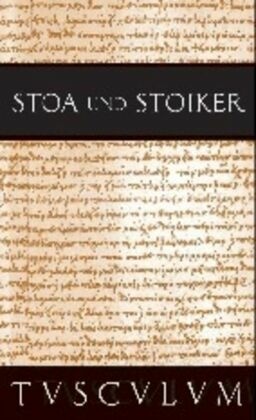
Stoa und Stoiker, 2 Bde. - Griechisch-Lateinisch-Deutsch
| Verlag | Akademie Verlag |
| Auflage | 2008 |
| Seiten | 2086 |
| Format | 12,2 x 11,7 x 19,0 cm |
| Gewicht | 1782 g |
| Reihe | Sammlung Tusculum |
| ISBN-10 | 3050054808 |
| ISBN-13 | 9783050054803 |
| Bestell-Nr | 05005480A |
Von stoischem Verhalten spricht man, wenn ein Mensch sich nicht durch seine Lebensumstände oder durch Schicksalsschläge aus dem Gleichgewicht bringen lässt. Die Philosophenschule der Stoa wurde von Zenon etwa um das Jahr 310 in Athen gegründet. Die ethische Hauptforderung heißt: in Übereinstimmung mit der menschlichen Natur zu leben. Dabei ist für den Stoiker nur die Tugend ein Gut und nur die Schlechtigkeit ein echtes Übel. Alles andere, z. B. der Besitz materieller, äußerer Dinge oder der Verlust geliebter Menschen, sind für einen Weisen kein Grund, vom steten Weg zu Ausgeglichenheit und Glückseligkeit abzuweichen. Nach annähernd sechzig Jahren gibt es endlich wieder eine neue große Stoiker-Ausgabe. Das zweibändige Werk, übersetzt und kommentiert von Rainer Nickel, ist nicht nur für Philosophen ein echtes Desiderat. Über Seneca oder Marc Aurel wirken die Gedanken dieser Philosophenschule bis in unsere Tage. Überraschend aktuell und modern wirken beispielsweise die Ratschläge, in allem das rechte Maß zu wahren oder in Übereinstimmung mit der Natur zu leben - ein philosophischer Weg zur seelischen Gesundheit. Im Mittelpunkt stehen die Begründer der Stoa, Zenon, Kleanthes, Persaios, Sphairos, Dionysios von Herakleia, Ariston, Herillos, Chrysippos sowie Panaitios und Poseidonios. Gewirkt habe sie in der Zeit zwischen dem 4. und dem 1. Jahrhundert v. Chr. Wichtige Vermittler stoischen Gedankengutes waren Cicero, Seneca und Marc Aurel.
Klappentext:
Since 1923 the Sammlung Tusculum has published authoritative editions of Greek and Latin works together with a German translation. The original texts are comprehensively annotated, and feature an introductory chapter. In the new volumes, additional essays delve into specific aspects of the works, illuminating their historical context and reception to the present day. The high academic quality of the new editions together with clearly written essays and annotations make the Sammlung Tusculum essential reading for students who are discovering an ancient author for the first time as well as professional scholars who would like to gain a deeper understanding of specific aspects of a given work. Moreover, the series is ideal for lay readers who would like to engage with antiquity through a reliable German translation. The series contains over 270 titles, available in print and eBook editions, making previously out-of-print titles and rarities available again for the first time. In orde r to celebrate the 90th anniversary of the series, De Gruyter is proud to present Tusculum Online, an eBook package which contains all titles that appeared between 1923 and 2013 - a fitting tribute to an important part of German publishing history.
